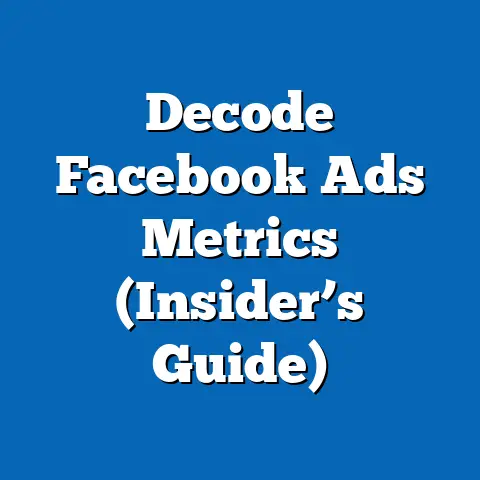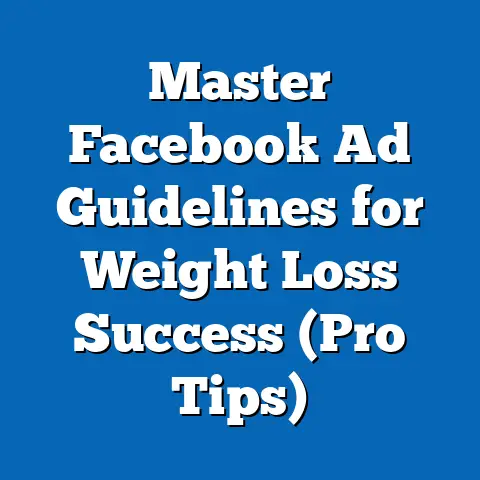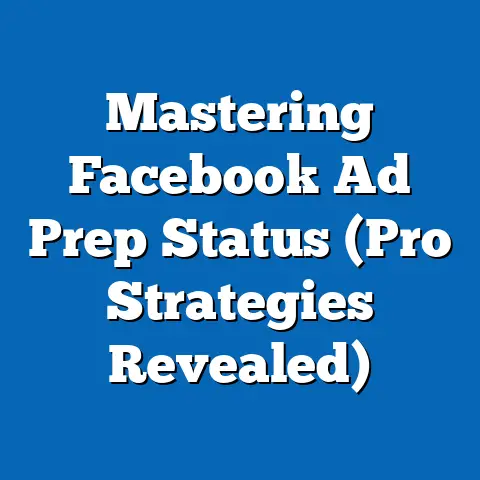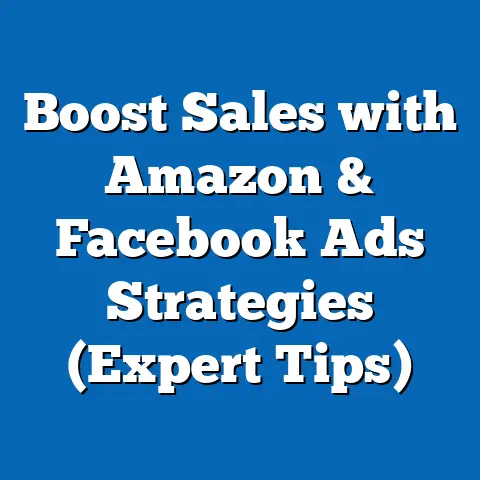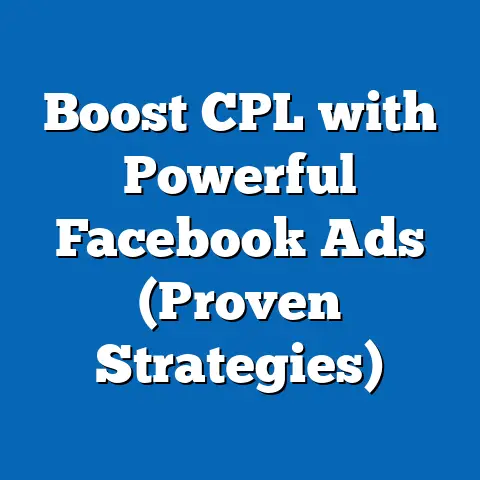Mastering Facebook Ads: Delete Ad Account (Essential Guide)
Have you ever felt like your Facebook Ads account is more of a headache than a helpful tool?
I know I have.
It’s like dealing with a persistent allergy – you try everything to manage it, but sometimes, the best solution is to eliminate the allergen altogether.
Just as understanding your allergy triggers and knowing when to avoid them is crucial, understanding when and how to delete a Facebook Ads account can be a strategic move for marketers looking to optimize their advertising efforts.
Think about it: you’ve poured time, money, and energy into your Facebook Ads, but the ROI just isn’t there.
Maybe your business strategy has shifted, or perhaps you’ve run afoul of Facebook’s ever-changing ad policies.
Whatever the reason, sometimes the best course of action is to hit the reset button.
This guide will walk you through everything you need to know about deleting a Facebook Ads account.
We’ll cover the reasons why you might consider it, the step-by-step process, alternatives you should consider, and what to do after you’ve taken the plunge.
My goal is to equip you with the knowledge and confidence to make the right decision for your business and move forward with a more effective advertising strategy.
Section 1: Understanding Facebook Ads
Let’s start with the basics.
What exactly are Facebook Ads, and why are they such a big deal in the digital marketing world?
What are Facebook Ads?
Facebook Ads are paid advertisements that appear on the Facebook platform, including Instagram, Messenger, and the Audience Network.
These ads can take many forms, from simple image ads to more complex video and carousel ads.
They allow businesses to reach a highly targeted audience based on demographics, interests, behaviors, and more.
Importance in Digital Marketing
In today’s digital landscape, Facebook Ads are a crucial component of any comprehensive marketing strategy.
Here’s why:
- Massive Reach: Facebook boasts billions of active users, providing businesses with unparalleled reach.
- Granular Targeting: Facebook’s advanced targeting options allow you to pinpoint your ideal customer with incredible precision.
This means you can show your ads to people who are most likely to be interested in your products or services.
I’ve seen campaigns where simply refining the target audience resulted in a 3x increase in conversion rates. - Measurable Results: Facebook Ads Manager provides detailed analytics, allowing you to track your ad performance and measure your ROI.
This data-driven approach allows you to continuously optimize your campaigns for better results. - Versatile Ad Formats: From simple image ads to engaging video ads and interactive carousel ads, Facebook offers a variety of ad formats to suit different marketing objectives.
- Cost-Effective: Compared to traditional advertising channels, Facebook Ads can be a more cost-effective way to reach a large audience.
You have control over your budget and can adjust your spending based on performance.
Types of Facebook Ads
Facebook offers a wide range of ad formats to suit different marketing goals and target audiences.
Here are some of the most common types:
- Image Ads: These are the simplest form of Facebook Ads, featuring a single image and accompanying text.
They’re great for showcasing products or services in a visually appealing way. - Video Ads: Video ads are highly engaging and can be used to tell a story, demonstrate a product, or share a testimonial.
I’ve found that video ads often outperform image ads in terms of engagement and conversions. - Carousel Ads: Carousel ads allow you to showcase multiple images or videos in a single ad unit.
This format is ideal for highlighting different features of a product, showcasing a product line, or telling a story in a sequential manner. - Collection Ads: Collection ads are designed for e-commerce businesses, allowing users to browse and purchase products directly from the ad.
This format is particularly effective for mobile users. - Lead Ads: Lead ads are designed to collect leads directly from Facebook, without requiring users to visit an external landing page.
This format is ideal for generating leads for sales teams or building an email list. - Instant Experience Ads: These are full-screen, mobile-optimized ads that offer an immersive and engaging experience.
They can include videos, images, carousels, and more.
Benefits for Businesses of All Sizes
Facebook Ads are not just for large corporations with massive marketing budgets.
Businesses of all sizes can benefit from using Facebook Ads to reach their target audience, generate leads, and drive sales.
Here’s how:
- Small Businesses: Facebook Ads can help small businesses reach a local audience and build brand awareness.
With targeted advertising, small businesses can compete with larger companies and attract new customers. - Medium-Sized Businesses: Facebook Ads can help medium-sized businesses expand their reach and grow their customer base.
With advanced targeting options, medium-sized businesses can reach specific demographics and interests, driving more qualified leads and sales. - Large Corporations: Facebook Ads can help large corporations reach a global audience and drive brand awareness.
With sophisticated targeting and analytics, large corporations can optimize their campaigns for maximum ROI.
Statistics and Case Studies
The effectiveness of Facebook Ads is well-documented.
Here are a few statistics and case studies that highlight the power of Facebook advertising:
- According to Statista, Facebook’s advertising revenue in 2023 was over $130 billion.
This demonstrates the significant investment businesses are making in Facebook advertising. - A study by HubSpot found that Facebook Ads have an average click-through rate (CTR) of 0.9%.
While this might seem low, it’s important to remember that Facebook Ads are often shown to a highly targeted audience, making the clicks more valuable. - Many case studies demonstrate the positive impact of Facebook Ads on businesses.
For example, a small e-commerce business was able to increase its sales by 30% after implementing a targeted Facebook Ads campaign.
I’ve personally seen similar results with my clients, especially when we focus on retargeting strategies.
Key Takeaway: Facebook Ads are a powerful tool for businesses of all sizes, offering unparalleled reach, granular targeting, and measurable results.
Understanding the different ad formats and benefits is crucial for developing an effective advertising strategy.
Section 2: The Reasons for Deleting a Facebook Ad Account
Now that we’ve covered the basics of Facebook Ads, let’s dive into the reasons why you might consider deleting your ad account.
This isn’t a decision to be taken lightly, but sometimes it’s the necessary step to take for a fresh start.
Poor Performance and Return on Investment (ROI)
One of the most common reasons for deleting a Facebook Ad account is poor performance and a lack of ROI.
You might be spending a significant amount of money on ads, but not seeing the results you expect.
This could be due to a variety of factors, such as:
- Ineffective Ad Creative: Your ads might not be visually appealing or compelling enough to capture attention.
- Poor Targeting: You might be targeting the wrong audience, resulting in low engagement and conversions.
- High Competition: Your industry might be highly competitive, driving up ad costs and making it difficult to stand out.
- Landing Page Issues: Even if your ads are effective, your landing page might not be optimized for conversions.
If you’ve tried optimizing your campaigns and still aren’t seeing results, deleting your ad account might be the best way to cut your losses and start fresh.
Changes in Business Strategy or Marketing Focus
Sometimes, a change in business strategy or marketing focus can necessitate deleting your Facebook Ad account.
For example:
- Shift in Target Audience: You might be targeting a new demographic or interest group that doesn’t align with your current ad account setup.
- New Product or Service: You might be launching a new product or service that requires a different advertising approach.
- Brand Refresh: You might be undergoing a brand refresh that requires a new ad creative and messaging.
- Focus on Other Channels: You might be shifting your marketing efforts to other channels, such as SEO, email marketing, or content marketing.
In these cases, deleting your ad account can be a way to clear the slate and start fresh with a strategy that aligns with your new business goals.
Violations of Facebook’s Advertising Policies
Violating Facebook’s advertising policies can lead to account suspension or even permanent ban.
Common violations include:
- Misleading or Deceptive Ads: Ads that make false claims or mislead users.
- Prohibited Content: Ads that promote illegal or harmful products or services.
- Discrimination: Ads that discriminate against certain groups of people based on their race, ethnicity, gender, or other protected characteristics.
- Copyright Infringement: Ads that use copyrighted material without permission.
If your ad account has been suspended due to policy violations, deleting it might be the only way to move forward.
While you can appeal suspensions, sometimes it’s easier to start a new account with a clean slate and a better understanding of Facebook’s policies.
I’ve seen several businesses struggle with this, and often, the time spent appealing could be better spent rebuilding with a policy-first approach.
Unmanageable Advertising Costs
Advertising costs on Facebook can fluctuate depending on factors like competition, targeting, and ad quality.
If you find that your advertising costs are spiraling out of control and you’re not seeing a positive ROI, deleting your ad account might be the best way to regain control of your budget.
I’ve personally encountered situations where a poorly optimized campaign was draining resources rapidly, and a fresh start was the most financially prudent option.
Real-Life Examples
Here are a few real-life examples of businesses that have benefited from starting fresh after deleting their accounts:
- E-commerce Startup: An e-commerce startup was struggling to generate sales with its initial Facebook Ads campaigns.
After deleting its ad account and starting fresh with a new targeting strategy and ad creative, the company saw a 50% increase in sales. - Local Restaurant: A local restaurant was running Facebook Ads to promote its menu and attract new customers.
However, the restaurant was targeting too broad of an audience, resulting in low engagement and conversions.
After deleting its ad account and starting fresh with a more targeted approach, the restaurant saw a significant increase in foot traffic and revenue. - Software Company: A software company was running Facebook Ads to generate leads for its sales team.
However, the company was using outdated ad creative and messaging that didn’t resonate with its target audience.
After deleting its ad account and starting fresh with a new ad creative and messaging, the company saw a 100% increase in lead generation.
Key Takeaway: Deleting a Facebook Ad account can be a strategic decision for businesses that are experiencing poor performance, changes in strategy, policy violations, or unmanageable advertising costs.
It’s a chance to start fresh with a new approach and a better understanding of Facebook advertising.
Section 3: The Process of Deleting a Facebook Ad Account
Okay, so you’ve decided that deleting your Facebook Ad account is the right move.
Now, let’s walk through the step-by-step process.
It’s important to understand the consequences and take the necessary precautions before you hit that delete button.
Step-by-Step Guide
Here’s how to delete a Facebook Ad account:
- Navigate to the Facebook Ads Manager: Go to Facebook Ads Manager and log in to your account.
- Select the Ad Account: If you have multiple ad accounts, make sure you select the one you want to delete from the dropdown menu in the top left corner.
- Go to Account Settings: In the Ads Manager, click on “Settings” (usually represented by a gear icon) in the left-hand navigation menu.
- Find “Ad Account Status”: Scroll down to the “Ad Account Status” section.
- Deactivate Account: You should see an option to “Deactivate Ad Account.” Click on it.
- Confirm Deactivation: Facebook will ask you to confirm your decision.
It will also explain the consequences of deleting your account.
Read this carefully! - Provide Reason for Deactivation (Optional): Facebook may ask you why you’re deactivating your account.
You can provide a reason or skip this step. - Click “Deactivate Ad Account”: Click the button to finalize the deactivation process.
Consequences of Deleting the Account
Before you proceed, it’s crucial to understand the consequences of deleting your Facebook Ad account:
- Loss of Data: You will lose access to all historical data associated with your ad account, including campaign performance, audience insights, and ad creative.
- Pixel Information: Your Facebook Pixel, which tracks website conversions, will be deactivated.
This means you won’t be able to track conversions from your Facebook Ads. - Ad History: All your past ad campaigns and ad sets will be permanently deleted.
- Inability to Run Ads: You will no longer be able to run ads from the deleted ad account.
Backing Up Data Before Deletion
Given the potential loss of data, it’s essential to back up your data before deleting your Facebook Ad account.
Here’s how to do it effectively:
- Download Reports: In the Ads Manager, go to the “Reports” section and download all relevant reports, including campaign performance, ad set performance, and ad performance.
- Export Audience Data: If you have custom audiences, export them to a CSV file.
This will allow you to re-upload them to a new ad account. - Save Ad Creative: Download all your ad creative, including images, videos, and text.
This will save you time and effort if you decide to run similar ads in the future. - Document Campaign Settings: Take screenshots or document your campaign settings, including targeting options, bidding strategies, and budget allocations.
Important Considerations
- Billing Information: Make sure you’ve paid all outstanding balances before deleting your ad account.
- Admin Access: If you’re the only admin of the ad account, make sure to assign admin access to another user before deleting the account.
- Business Manager: If your ad account is linked to a Business Manager, you’ll need to remove it from the Business Manager before deleting it.
Key Takeaway: Deleting a Facebook Ad account is a straightforward process, but it’s crucial to understand the consequences and back up your data beforehand.
Taking these precautions will ensure a smooth transition and minimize any potential disruptions to your marketing efforts.
Section 4: Alternatives to Deleting a Facebook Ad Account
Before you take the drastic step of deleting your Facebook Ad account, let’s explore some alternatives.
Sometimes, a few tweaks and adjustments can be enough to turn things around.
Pausing Campaigns
One of the simplest alternatives to deleting your ad account is to pause your campaigns.
This allows you to stop spending money on ads without losing your data or ad history.
Pausing campaigns can be useful in the following situations:
- Seasonal Business: If your business is seasonal, you might want to pause your campaigns during the off-season.
- Budget Constraints: If you’re facing budget constraints, you might want to pause your campaigns to conserve resources.
- Campaign Optimization: If your campaigns are underperforming, you might want to pause them to reassess your strategy and make necessary adjustments.
Modifying Ad Strategies
Sometimes, all it takes is a few tweaks to your ad strategies to improve performance.
Here are a few modifications you can consider:
- Refine Targeting: Experiment with different targeting options to reach a more relevant audience.
- Update Ad Creative: Refresh your ad creative with new images, videos, and text.
- Adjust Bidding Strategies: Experiment with different bidding strategies to optimize your ad spend.
- Optimize Landing Pages: Make sure your landing pages are optimized for conversions.
I’ve personally seen significant improvements in campaign performance simply by refining the targeting options or updating the ad creative.
Don’t underestimate the power of small changes!
Consulting Facebook Ads Experts
If you’re struggling to improve your campaign performance, consider consulting with a Facebook Ads expert.
A qualified expert can audit your account, identify areas for improvement, and provide tailored recommendations.
I often recommend this option to businesses that are new to Facebook Ads or have limited experience.
A fresh pair of eyes can often spot opportunities that you might have missed.
Reactivating an Account vs. Starting Anew
This is a question I get asked a lot: “Should I reactivate my old account or start a new one?” The answer depends on your specific situation.
- Reactivate: If your ad account was deactivated due to a temporary issue or policy violation that you’ve resolved, reactivating it might be the best option.
This will allow you to retain your data and ad history. - Start Anew: If your ad account was permanently banned or you’re looking for a fresh start, starting a new account might be the better option.
This will allow you to create a new advertising strategy from scratch.
To decide, consider the following:
- Severity of the Issue: Was the account suspended for a minor infraction or a major violation?
- Data Value: How valuable is the data in your old account?
Is it worth the effort to try and recover it? - Long-Term Goals: What are your long-term advertising goals?
Will starting anew help you achieve them more effectively?
Key Takeaway: Before deleting your Facebook Ad account, consider alternatives such as pausing campaigns, modifying ad strategies, consulting with experts, and reactivating your account.
These options might provide a more cost-effective and less disruptive solution.
Section 5: After Deletion – What’s Next?
So, you’ve taken the plunge and deleted your Facebook Ad account.
What’s next?
It’s time to assess your overall marketing strategy, learn from your past experiences, and chart a new course for your advertising efforts.
Assess Your Overall Marketing Strategy
Deleting your Facebook Ad account provides an opportunity to step back and assess your overall marketing strategy.
Ask yourself the following questions:
- What are my business goals?
- Who is my target audience?
- What are my key performance indicators (KPIs)?
- What are my strengths and weaknesses?
- What are my opportunities and threats?
Answering these questions will help you develop a clear understanding of your current situation and identify areas for improvement.
Explore New Platforms and Strategies
While Facebook Ads can be a powerful tool, it’s not the only game in town.
Consider exploring other digital marketing channels that might offer better ROI, such as:
- Google Ads: Google Ads can help you reach a wider audience and drive traffic to your website.
- LinkedIn Ads: LinkedIn Ads can help you reach a professional audience and generate leads for your business.
- Twitter Ads: Twitter Ads can help you reach a younger audience and build brand awareness.
- SEO: Search engine optimization (SEO) can help you improve your website’s ranking in search results and drive organic traffic.
- Email Marketing: Email marketing can help you nurture leads and drive sales.
- Content Marketing: Content marketing can help you attract and engage your target audience with valuable and informative content.
Setting Up a New Ad Account
If you decide to return to Facebook Ads, approach it with a refined strategy and a clean slate.
Here are some tips for setting up a new ad account:
- Review Facebook’s Advertising Policies: Make sure you have a thorough understanding of Facebook’s advertising policies to avoid future violations.
- Define Clear Goals and KPIs: Establish clear goals and KPIs for your advertising efforts.
This will help you measure your progress and optimize your campaigns. - Develop a Targeted Advertising Strategy: Develop a targeted advertising strategy that aligns with your business goals and target audience.
- Create Compelling Ad Creative: Invest in creating compelling ad creative that captures attention and drives engagement.
- Monitor Your Campaigns Closely: Monitor your campaigns closely and make necessary adjustments to optimize performance.
Learning from Past Experiences
One of the most important steps after deleting your Facebook Ad account is to learn from your past experiences.
What went wrong?
What could you have done differently?
By analyzing your past mistakes, you can avoid repeating them in the future.
Key Takeaway: Deleting your Facebook Ad account is not the end of the road.
It’s an opportunity to reassess your marketing strategy, explore new platforms, and learn from your past experiences.
By approaching your advertising efforts with a fresh perspective, you can achieve greater success in the long run.
Conclusion
Deleting a Facebook Ads account can feel like a daunting decision, but as I’ve shown, it can be a strategic move to revitalize your marketing efforts.
It’s akin to managing an allergy: sometimes, the best course of action is to eliminate the allergen.
By understanding the reasons for deletion, the process involved, and the alternatives available, you can make an informed choice that aligns with your business goals.
Remember, deleting your ad account is not a sign of failure.
It’s a sign that you’re willing to adapt and evolve your strategy to achieve better results.
Approach your future advertising efforts with a fresh perspective, equipped with the knowledge and insights you’ve gained.
Mastering your Facebook Ads, or any advertising strategy, is an ongoing journey of learning, adapting, and optimizing.
Call to Action
I’d love to hear about your experiences with Facebook Ads.
Have you ever considered deleting your ad account?
What challenges have you faced?
Share your thoughts and insights in the comments section below.
Also, be sure to check out my other guides on Facebook advertising strategies to further enhance your knowledge and skills in this area.
Let’s learn and grow together!


